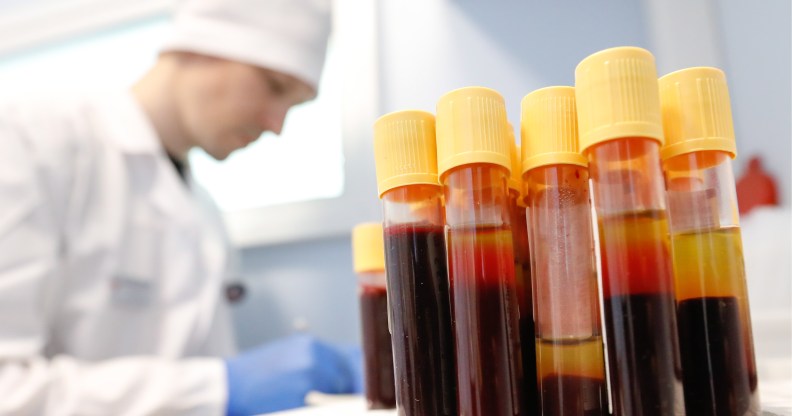There was zero increase in HIV infections from donated blood after the US relaxed its donor laws

Artyom Geodakyan/Getty
There was zero increase in the number of HIV infections spread through blood transfusions in the United States after a lifetime ban on gay and bisexual male donors was lifted.
The claims were made by Dr Eduard Grebe of non-profit transfusion medicine organisation Vitalant yesterday (March 11) at the Conference on Retroviruses and Opportunistic Infections, AIDSmap reports.
Speaking at the conference – which was conducted virtually due to coronavirus concerns – Dr Grebe explained that researchers analysed 60 per cent of all blood donations in the United States both before and after the lifetime ban was lifted.
There was no increase in HIV-infections from blood transfusions after the US relaxed rules on gay and bisexual men.
The lifetime ban on gay and bisexual men donating blood was lifted in the United States in 2015 and was replaced with a policy that requires queer men to abstain from sex for 12 months in order to donate blood. Similar policies exist across the world and are associated with the HIV/AIDS epidemic of the 1980s, which predominantly affected queer men.
While there is a robust screening process in place, a small number of people contract HIV through blood transfusions. However, this number did not increase after the rules governing gay and bisexual men were relaxed in 2015.
There is no evidence that the implementation of a 12-month MSM deferral policy resulted in increased HIV incidence in.
Researchers found that there were 2.6 cases of HIV among 100,000 first-time blood donors per year in the 15 months before the policy was changed.
In the 15 months after the policy was changed, there were 2.9 cases per 100,000 donors. While this looks like a slight increase, researchers said that it was so small that it was considered insignificant and was likely due to chance rather than any change to policy.
‘No evidence’ that the change increased infections.
Researchers also found that there were certain groups who were more likely to have HIV, including those aged 18-24, Black men, Hispanic men and those living in southern states.
“There is no evidence that the implementation of a 12-month MSM deferral policy resulted in increased HIV incidence in, and therefore transfusion transmission risk from, first-time blood donors in the United States,” Dr Grebe said.
Using a mathematic modelling system, the residual risk of contracting HIV through a blood transfusion was calculated. Dr Grebe put this at one in three million transfusions of red blood cells and one in 1.8 million transfusions of frozen plasma.

